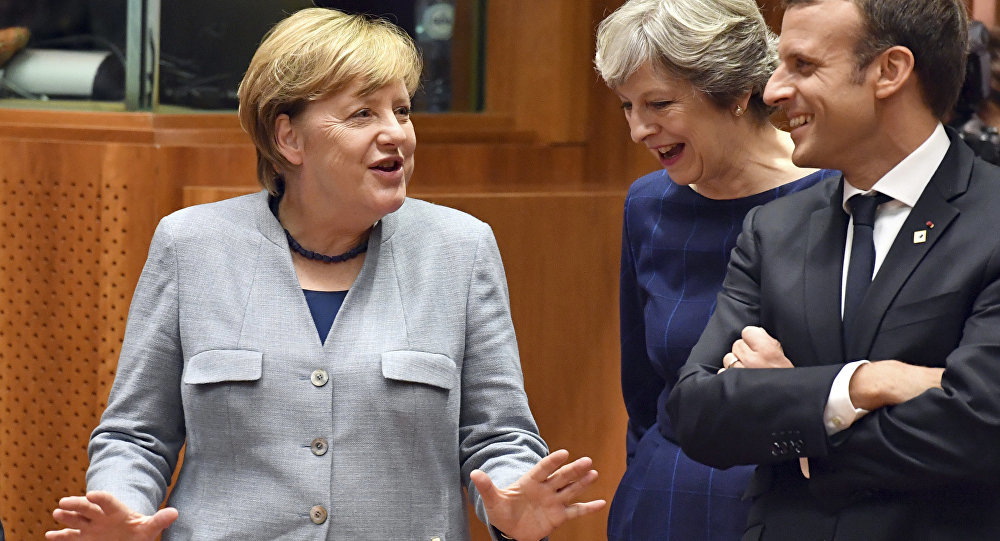In Europe, who is blamed for cancelling JCPOA?

TEHRAN - French President, Emanuel Macron, is still confused about the nuclear deal with Iran. In August 2017, Macron promised Donald Trump that he would do his best to include Iran's missile capability in the Joint Comprehensive Plan of Action (JCPOA), or try to limit our missile power in a separate agreement. However, the Elysee Palace officials have failed in fulfilling this mission so far.
France, on the one hand, is the main potential partner of Trump in the process of cancelling the JCPOA, and on the other hand, it's pretending to show support for the nuclear deal with Iran. What has happened so far has been the result of the French authorities' dual and paradoxical approach towards the JCPOA. Macron's contribution to the realization Trump's policies showed that this young French politician has yet a long way to get mature in politics!
The New York Times has recently published an article on Macron and Trump's bilateral relations. We read in this article by "Roger Cohen": "It is tempting to say that the relationship between President Emmanuel Macron of France and President Trump is the unlikeliest of friendships, but that would be to miss the point."
Cohen continues: "Sure, they agree on very little. Not on Iran. Not on trade. Not on the European Union. Not on climate. Not on whether to criticize Vladimir Putin. Not on the importance of dignity, or truth, or the Enlightenment. Still, I hear that they speak all the time. Trump follows Macron’s labor-market reforms and calls to congratulate him. The first state visit of his administration will be Macron’s to Washington next month, a special honor for “a great guy.” The French president is Trump’s best friend in Europe, and possibly beyond. Things fizzled with Theresa May, the British prime minister. They never went anywhere with Germany’s Angela Merkel. Trump-Macron is the only trans-Atlantic hinge not creaking."
Cohen then argue that: "If Macron cannot avert the worst on Iran — a decision by Trump on May 12 to torpedo the nuclear deal by no longer waiving sanctions — then all bets are off. The accord, which reversed the program that had made Iran a threshold nuclear power, is working."
What is really going on between the White House and the Elysee Palace? What is certain is that Emmanuel Macron has been disappointed about the U.S. remaining in the JCPOA regarding the appointment of people such as Mike Pompeo and John Bolton at the White House. As Western sources have emphasized, even if the European Troika succeeds in imposing its position on Iran's missile embargo on other EU member states, the United States will not continue to do so.
In this case, the European Union, and especially the European Troika, will lose their credibility, even more than before, in the international system. Macron was among the European politicians who believed that more talks on the nuclear deal would be useful and that further restrictions on the nuclear deal against Iran would be useful. But the fact is that the young French president could have predicted the outcome of playing at the White House ground, considering Trump's withdrawal from the Paris Climate Agreement.
The fact is that if Donald Trump, the U.S. President, withdraws from the nuclear deal with Iran, Macron will be the second most likely accused of canceling the deal with the world's public opinion and international relations analysts. The main question here is that what's Macron going to do in the time remaining until May 17 (the deadline set by Trump) to avoid the cancellation of the JCPOA. Will the young French president have the power to compensate for his serious mistakes in dealing with the United States and Trump's government?
Will Macron prefer to pursue an almost impossible option of "maintaining the JCPOA without America" with British Prime Minister "Theresa May" and the German Chancellor "Angela Merkel"? The answers to these questions are still unclear, but in this equation, one point is obvious: In this deal with Trump, the French president made the worst possible mistake.
From the beginning, the Islamic Republic of Iran has warned Macon and other European authorities that a dual approach towards the nuclear deal can't lead to "restraining the U.S. government". However, the European authorities chose to "make a deal with the White House" instead of "standing against America's lack of commitment to the JCPOA". Obviously, the result of this deal is nothing but failure. As noted above, Emanuel Macron, Jean-Yves Luderian and other officials of the Elysee Palace will be known as second-line defendants of the U.S.-led violations.
However, some news sources in the United States, including the New York Times, believe that the meeting between Macron and Trump at the White House, which will take place before the final announcement of the American President regarding the nuclear accord, will be determining and crucial. Will Macron stick to his previous mistakes with the United States at this meeting? Or will he declare an independent and decisive stand towards the nuclear accord?
Leave a Comment